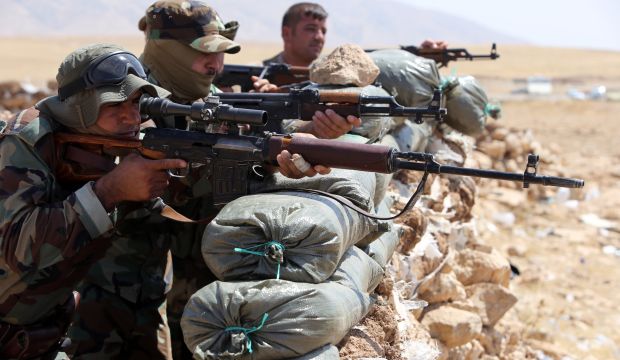
Iraqi Kurdish Peshmerga fighters monitor the area from their front-line position in Bashiqa, a town 8 miles (13 kilometers) north-east of Mosul, Iraq, on August 16, 2014. (AFP Photo/Ahmad Al-Rubaye)
London, Asharq Al-Awsat—British Prime Minister David Cameron warned on Sunday that the Islamic State of Iraq and Syria (ISIS) posed a threat to British and European security and promised new measures to combat the organization.
Writing in London’s Sunday Telegraph newspaper, Cameron said: “The creation of an extremist caliphate in the heart of Iraq and extending into Syria is not a problem miles away from home . . . if we do not act to stem the onslaught of this exceptionally dangerous terrorist movement, it will only grow stronger until it can target us on the streets of Britain.”
In a strongly worded article, Cameron warned: “We are in the middle of a generational struggle against a poisonous and extremist ideology, which I believe we will be fighting for the rest of my political lifetime . . . If [ISIS] succeeds, we would be facing a terrorist state on the shores of the Mediterranean and bordering a NATO member.”
The prime minister’s declaration came a day after the publication of a letter from the Bishop of Leeds, the Right Reverend Nicholas Baines, hitting out at what he said was the government’s failure to combat the spread of Islamic extremism and offer shelter to Christians displaced by militants.
In a letter, sent to the prime minister on Friday, and published on Baines’s website on Saturday, the bishop attacked UK policy as poorly conceived, saying that it appears to be determined by “the loudest media voice at any particular time,” and that it was “difficult to discern the strategic intentions” of the government.
The letter also questions why the UK government has made little public effort to protect Iraq’s Christians, in contrast to the humanitarian assistance recently despatched to Yazidis trapped on Iraq’s Mount Sinjar.
“The French and German governments have already made provision, but there has so far been only silence from the UK government,” the bishop wrote.
Both interventions are likely to stimulate further public debate about Britain’s role in the ongoing crisis in Iraq, which has seen Cameron’s government facing criticism for its response, which has so far been largely limited to the airdropping of humanitarian aid.
In response, Cameron said a “broader, political, diplomatic, and security response” was needed to tackle the threat posed by ISIS, and pointed to the recent European decision to begin sending military equipment to Kurdish fighters in Iraq, and moves to cut the sources of ISIS’s funding at the UN Security Council.
The prime minister ruled out a large British military presence on the ground, however, saying: “I agree that we should avoid sending armies to fight or occupy, but we need to recognise that the brighter future we long for requires a long term plan for our security as well as one for our economy.”
Instead, he promised to work with international and regional allies to stabilize Iraq and “support the building blocks of democracy” as part of a long-term strategy, as well as targeting ISIS sympathizers closer to home.
